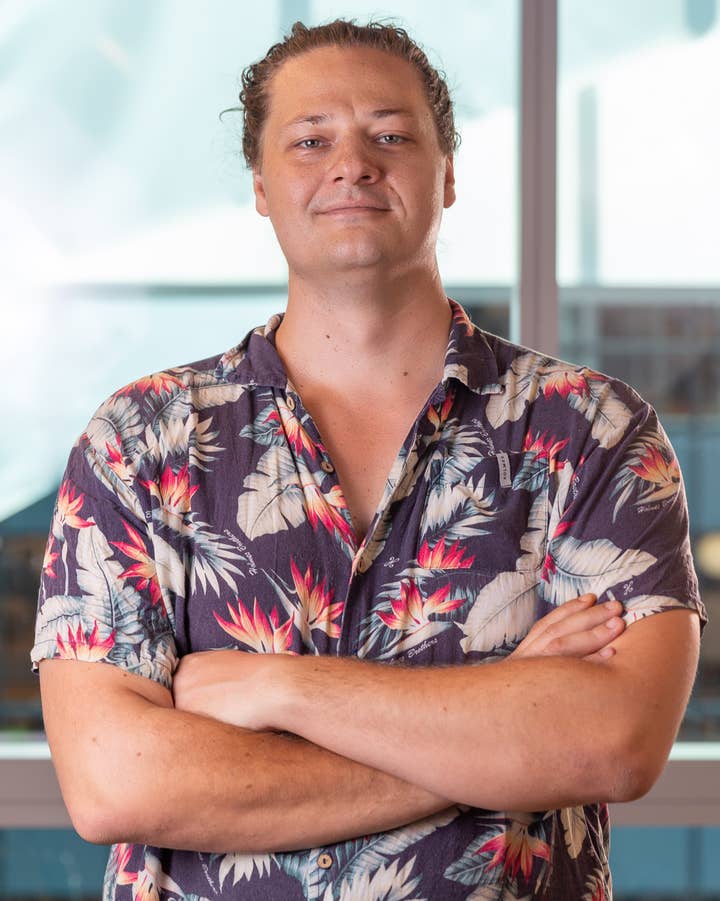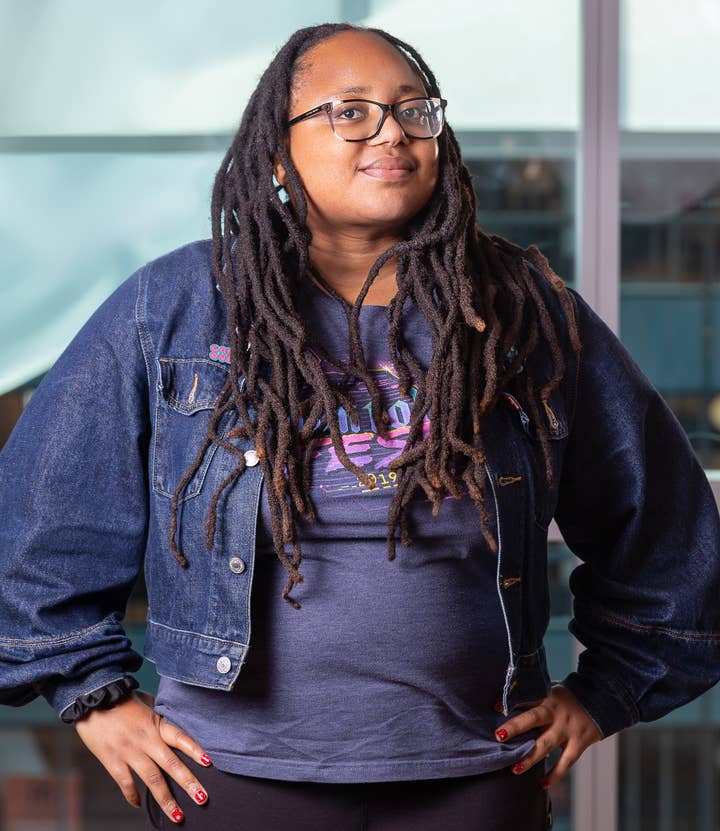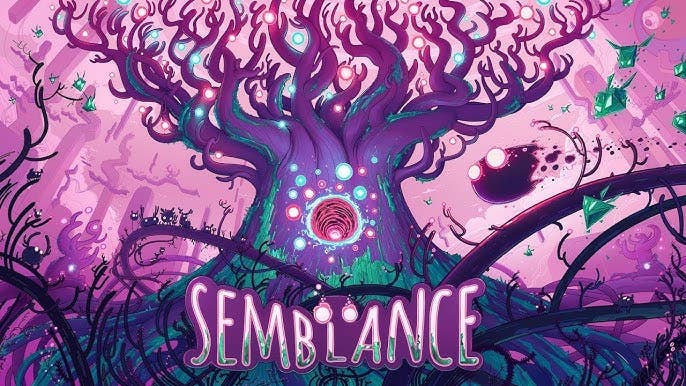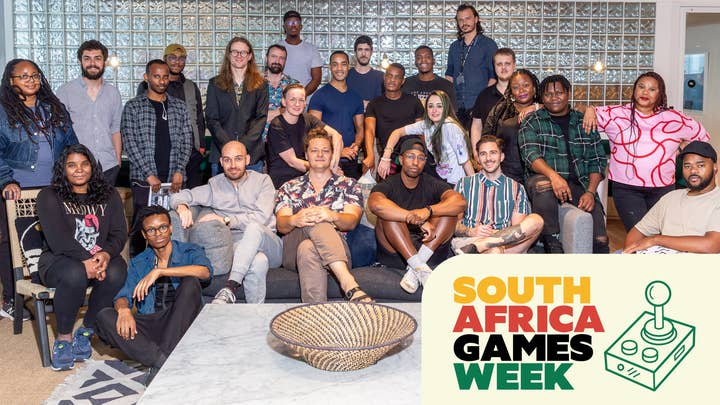Nyamakop: "There's demand for African-created content outside of the continent"
Ben Myres and Sithe Ncube on making African-inspired titles, and the multifaceted challenges of funding games in South Africa
You can read all our South Africa Games Week articles on this page.
Nyamakop, arguably one of the most well known studios within South Africa, was founded in 2016, initially as a business endeavour to turn a university project into a commercial game, which became 2018's Semblance.
"We co-founded the studio with [Naughty Dog veteran] Judd Simantov, who's South African," CEO and creative director of Nyamakop, Ben Myres, tells GamesIndustry.biz. "He saw our final year project and was like, 'You should make this into a commercial project'. [Semblance] was the first African-developed IP on any Nintendo console ever. Since then, we've been working on our unannounced next project, which is very large and very tiring," he smiles.
The specifics of this mysterious title haven't been divulged, but Myres tells us a bit about the bigger picture.
"All I can really say is that it's an African-inspired game. Things like Black Panther coming out, also the success of Nollywood and Afrobeats… We even have an artist from South Africa, Tyla, who's 21 [and just won] a Grammy. It's showing that there's a lot of demand for African-created content outside of the continent.
"Nyamakop's key strategy and goal right now is African-inspired games for a global audience, at as high a production value as we can make on the continent"Ben Myres

"So Nyamakop's key strategy and goal right now is African-inspired games for a global audience, at as high a production value as we can make on the continent. We're doing a lot of things production value-wise that I don't think many people have tried to do on the continent before, and that's why it's taking so long."
Nyamakop bolstered its team for the project, with 30 people working on it. Part of associate producer Sithe Ncube's job is to manage that team.
"I'm learning so much, because this is my first full-time industry job," she says. "When I joined [Nyamakop in 2021], we were nine, and we've grown to 30. So I'm seeing people come in, and responsibilities change as the team grows larger, and there are certain things that you can't do with [bigger] teams.
"When I started out, I would be looking at what everyone was doing on a daily basis. Every morning, I would check people's task boards, and follow up on what everyone's doing. But with 30 people, you can't do that."
Nyamakop is based in Johannesburg and has a hybrid system of remote working with regular office days (the studio has 29 staff in South Africa, plus a few contractors throughout the continent).
"Because we're trying to create a more diverse games studio, it means we're not hiring people who have worked in games [before], because they're all white men, so we can't do it that way," Myres says. "So, we're hiring people out of related industries that have never shipped games before. But then if you've never shipped a game before and you're trying to make a very big game in an engine no one knows, at a production value never attempted on the continent before... then the communication issues are really hard.
"And honestly, offices are better for that from what we've seen. If you don't have the infrastructure or culture set up to do remote working well, or the seniority to make things trickle down, then communication is really tough for remote work."
Having partnered with Good Shepherd for Semblance, Nyamakop will be working with a publisher again for its upcoming title (though they haven't announced which one yet). The benefits of working with a publisher is first and foremost "safety," Ncube says.
"There's some level of confusion, I can say, in terms of unexplored aspects of the African games market"Sithe Ncube

"The industry is unpredictable. Just having that safety, knowing you're guaranteed to be able to work on this for a certain amount of time, is a benefit. I'm also speaking [as strategic advisor] with Humble Games' Black Games Developer Fund and being able to just have people take care of things and [not] having to do everything yourself is a benefit."
Myres adds that it's specifically important when you're new to the industry, like Nyamakop was when the team did Semblance. But realistically, he says, funding is often the main reason why developers choose to go with publishers.
The mention of funding brings us to talk about the challenges of making games in South Africa, financing being a particularly prominent one. Ncube points out the difficulty for some developers to get their games to a "minimum viable product."
"That's really tough for a lot of people," she continues. "Historically, people of colour have been marginalised in South Africa so some people don't have the generational income, or even freedom, to explore that."
She says she understands the "survival mode" that some developers have to get into, making the type of games they think will work rather than the game they truly want to make.
Myres adds: "There are a lot of studios in South Africa [but] there are only really six major ones, and all of them are run and owned by white men. And I think that has a large knock-on effect of the inability to take that risk. I'm not going to tell their stories, but a lot of my ability to do Nyamakop is based purely on privilege and generational wealth, and the crazy safety net you have. I think the South African games industry, last time we did a survey, is like [80%] white men."
Looking at South Africa's 2022 census, Black Africans represented 81.4% of the population, followed by Coloureds at 8.2%, white people at 7.3%, and Indian/Asian people at 2.7%. The games industry in the country is in a sharp contrast with this reality.
Nyamakop is trying to bring some balance, with Myres estimating that around 80% of the studio is people of colour.
"Our leadership team is very diverse at least," he says. "If you aren't able to take the risk to start your own studio, how are we ever going to make the industry more diverse? And the only way you do that is by allowing stable employment for diverse folks to get into the industry. Because really, in the long term, where we need to be is PoC-owned-and-run studios. But if there's no way for you to enter the industry stably and get good at making games, we can't just jump there automatically.
"[When] a person of colour leaves Nyamakop to stay in the industry, that makes me happy. We haven't really had anyone leave and not stay in the industry. It's very sad to see them go, obviously, but the fact that they leave to stay in the industry means Nyamakop can become a place that's stable, safe, and fun [for South African people of colour to enter the industry]."

Going back to the funding discussion, Myres says there are issues with how that challenge is perceived as well.
"The way we talk about it and frame it, particularly on the continent or in South Africa, is like, 'We lack access to funding!' And I'm like… the network is there. Sithe literally is trying to give people money on the Black Game Developers Fund all the time. We clearly have access to the network to make funding capable. Our problem is, are we making things that are fundable? And that's the context, which also requires funding, but it's a catch-22."
Ncube adds that it's also more generally about whether people are making the right projects and, if not, how do we get them to make them?
"How do they get educated? People have thrown out possible solutions like co-production, or large studios setting up shop in South Africa or in Africa itself. I don't know how that will turn out. And I think that another thing that will help us is time, unfortunately."
She continues: "There is [also] the thing about making games for Africans – we say that a lot. We say that should be a thing, we should make games for Africans because we're playing games that were made in the west. But will people even play those games, if you make them? And then if you make games targeting people, like you say, 'Oh, everyone here has an Android, everyone plays free-to-play games,' even if you were to make one that's really good, there's no guarantee that you'll have a lot of people playing it. So, I think there's some level of confusion, I can say, in terms of unexplored aspects of the African games market."
Myres also highlights challenges at two ends of a spectrum for the industry in South Africa: difficulty to get access to senior talent when you scale, and difficulty to produce high quality prototypes when you start.
"Lack of senior talent really hurts us very badly," he says. "[Nyamakop] actually can't grow much further beyond 30, I think, not because there aren't a lot of juniors – there are – and not because we don't want to hire juniors. But it's pointless to hire juniors if there's no senior to teach them and manage them.
"And we have such a small pool, and they're starting to get very centralised in a few companies; I'm not just going to be trying to poach their employees! So, it does mean you have to find people out of nowhere. I'm literally searching on GitHub for this engine plus South Africa, and going through every user on there. Finding creative ways to find talent that you don't know is out there. So, lack of senior talent is a big one.
"And then we need to get better at making really high-quality prototypes. And it's not necessarily just, 'Be good at game jams.' It's more than that. If we just have people who can make good prototypes, it's going to take us very far, because we have almost everything else you need."
"In the long term, where we need to be is PoC-owned-and-run studios. But if there's no way for you to enter the industry stably and get good at making games, we can't just jump there automatically"
On a more practical aspect, the industry needs to deal with the challenge that is load shedding – the country is out of power for a certain amount of time every day, which varies depending on the location. To mitigate the impact of the power cuts, most places have backup generators.
"We literally have to buy people little UPSs [uninterruptible power supplies] and our office is really expensive, and the reason for it is the power generator," Myres continues. "The plugs don't go off, so that no one loses data, because we have a build machine running all the time. We can't just have it going on and off. So, we do spend a lot of time and money [on this]. A UPS to make someone be able to run a gaming PC for two or three hours is between 15,000 and 20,000 rand."
That's roughly between $780 and $1,050. To get things in perspective, it's worth noting that the average monthly salary in South Africa in 2023 was roughly 25,000 rand (about $1,310), according to the country's Quarterly Employment Statistics published in December 2023.
Looking ahead, Myres hopes for success, not only to be able to continue making games but to be able to give back to the South African games industry and to establish once and for all that there's a global audience for African games.
"I would love to make an absolutely large amount of money, not because I want to be rich, but I think with that capital, the amount of cool stuff Nyamakop can continue to do and build on is really great. We can allow more people to enter the industry, we can join the brave people trying to figure out how to monetise the African continent, and just, if we make a lot of money on this project, it means that there really, truly is a market for African-inspired games around the world, and that will have a pretty significant impact for the continent scene as a whole. Because it'll show to the continent, we don't just have to focus on Africa. We can make this. If we make something that's African-inspired and of a high quality, the world will want it."
Sign up for the GI Daily here to get the biggest news straight to your inbox









